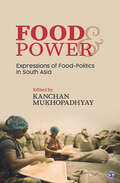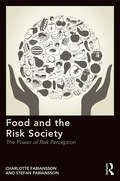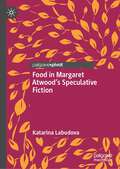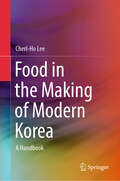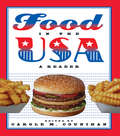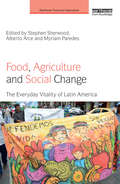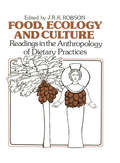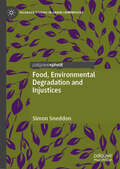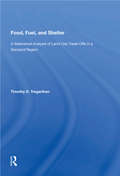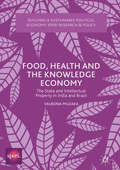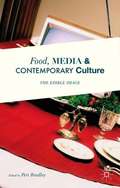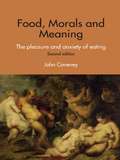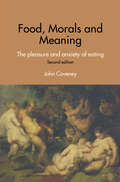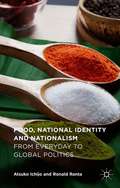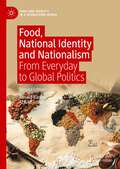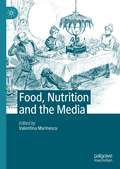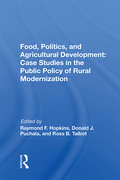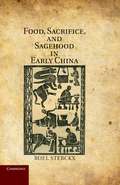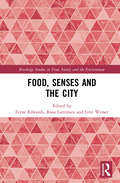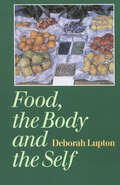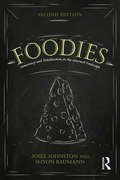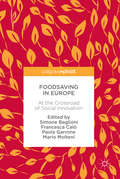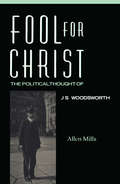- Table View
- List View
Food and Power: Expressions of Food-Politics in South Asia
by Kanchan MukhopadhyayFood practices of a people is the product of multiple factors. Endogenous as well as exogenous factors influence people’s opinion and preferences about food. In India and its neighbouring countries, food practices are often delimited by economic standing, religion, caste and analogous systems of social ranking of the consumers. State and market forces also influence food behaviour by exercising control over production and trade. Food and Power: Expressions of Food-Politics in South Asia studies power relations between those who eat and those who decide (or at least try to decide) what people should eat. It raises questions pertaining to the politicization of ethnographic tradition in South Asia in relation to the intersection of religion, economy and food. This book explores how traditional food practices have undergone change owing to the influences of migration globalization and popular media to understand how ethos of the powerful affects the foodways of relatively weaker ethnic, religious, occupational and gender groups
Food and the Risk Society: The Power of Risk Perception
by Charlotte Fabiansson Stefan FabianssonThis book offers a comprehensive understanding of the current scientific knowledge concerning risks associated with food preparation, processing and consumption, with particular attention to the gap between scientific research and public perception. Examining the effects of food on the body from both micro and macro levels, it covers a range of broad themes and current concerns, including obesity and the 'obesity epidemic', the benefits or otherwise of dietary supplements, caffeine consumption, GM food, alcohol, organic food, the consumption of fruit and vegetables, and pathogens and contaminants. Thematically arranged according to the application of broad theoretical approaches in sociological theory – the socio-cultural perspective, the risk society perspective and the governmentality perspective – each chapter focuses on a particular area of interest or concern in relation to food, covering the existing literature in detail and offering illustrative empirical examples, whilst identifying gaps in knowledge and areas for further research. An accessible and rigorous examination of food and health, and the discrepancy between scientific opinion and consumer perception of safe food – the real risks versus the perceived risks – this book will appeal to scholars and students of sociology, geography, food, nutrition and environmental ecosystems, as well as health professionals.
Food in Margaret Atwood’s Speculative Fiction
by Katarina LabudovaThis book looks at Margaret Atwood’s use of food motifs in speculative fiction. Focusing on six novels – The Handmaid’s Tale and The Testaments, the Maddaddam trilogy, and The Heart Goes Last – Katarina Labudova explores the environmental, ecological, and cultural questions at play and the possible future scenarios which emerge for humanity’s survival in apocalyptic and post-apocalyptic conditions. Labudova argues that food has special relevance in these novels and that characters’ hunger, limited food choices, culinary creativity and eating rituals are central to Atwood’s depictions of hostile environments. She also links food to hierarchy, dominance and oppression in Atwood’s novels, and foregrounds the problem of hunger, both psychological or physical, caused by pollution and loss of contact with the natural and authentic. The book shows how Atwood’s writing draws from a range of genres, including apocalyptic fiction, science fiction, speculative fiction, dystopia, utopia, fairy tale, myth, and thriller – and how food is an important, highly versatile motif linking these intertextual threads.
Food in the Making of Modern Korea: A Handbook
by Cherl-Ho LeeThis handbook offers an updated and comprehensive presentation of knowledge on Korean modern and contemporary food history. It covers the changes in food availability, nutrition, and the health status of Koreans, and the Korean food industry's development from the late period of Joseon dynasty in the mid-19th century, to the present. This period includes the severe poverty and food shortage of the Joseon dynasty, followed by the Japanese invasion, Independence and the South-North division, the Korean war, and rapid industrial development. The influence of national and international environments and political changes during the last 150 years on the Korean food security and the nutritional situation of the people is demarcated. In doing so, the author makes novel suggestions on possible contributions to alleviate the world food crisis in the future. Relevant to food historians and food scientists, and East Asian studies scholars with a particular interest in Korean culture and history,this is a pioneering work that elucidates the driving forces for the development and betterment of Korean society—through food acquisition.
Food in the USA: A Reader
by Carole M. CounihanFrom Thanksgiving to fast food to the Passover seder, Food in the USA brings together the essential readings on these topics and is the only substantial collection of essays on food and culture in the United States. Essay topics include the globalization of U.S. food; the dangers of the meatpacking industry; the rise of Italian-American food; the meaning of Soul food; the anorexia epidemic; the omnipotence of Coca-Cola; and the invention of Thanksgiving. Together, the collection provides a fascinating look at how and why we Americans are what we eat.
Food, Agriculture and Social Change: The Everyday Vitality of Latin America (Earthscan Food and Agriculture)
by Alberto Arce Myriam Paredes Stephen SherwoodIn recent years, food studies scholarship has tended to focus on a number of increasingly abstract, largely unquestioned concepts with regard to how capital, markets and states organize and operate. This has led to a gulf between public policy and people’s realities with food as experienced in homes and on the streets. Through grounded case studies in seven Latin American countries, this book explores how development and social change in food and agriculture are fundamentally experiential, contingent and unpredictable. In viewing development in food as a socio-political-material experience, the authors find new objects, intersubjectivities and associations. These reveal a multiplicity of processes, effects and affects largely absent in current academic literature and public policy debates. In their attention to the contingency and creativity found in households, neighbourhoods and social networks, as well as at the borders of human–nonhuman experience, the book explores how people diversely meet their food needs and passions while confronting the region’s most pressing social, health and environmental concerns.
Food, Ecology and Culture: Readings in the Anthropology of Dietary Practices (Food and Nutrition in History and Anthropology)
by J. R. K. RobsonFirst published in 1980. Routledge is an imprint of Taylor & Francis, an informa company.
Food, Energy and the Creation of Industriousness
by Craig Muldrew"Until the widespread harnessing of machine energy, food was the energy which fuelled the economy. In this groundbreaking study of agricultural labourers' diet and material standard of living Craig Muldrew uses new empirical research to present a much fuller account of the interrelationship between consumption, living standards and work in the early modern English economy than has previously existed. The book integrates labourers into a study of the wider economy and engages with the history of food as an energy source and its importance to working life, the social complexity of family earnings and the concept of the 'industrious revolution'. It argues that 'industriousness' was as much the result of ideology and labour markets as labourers' household consumption. Linking this with ideas about the social order of early modern England the author demonstrates that bread, beer and meat were the petrol of this world and a springboard for economic change"--
Food, Environmental Degradation and Injustices: How the Way We Eat Will Destroy Us (Palgrave Studies in Green Criminology)
by Simon SneddonWhat if the global trade in key food commodities suddenly ceased? This book takes readers on a thought-provoking journey through the environmental, ethical, and social justice issues embedded in our food systems. From meat and seafood to staple crops like tomatoes, potatoes, palm oil, and soya, it explores how industrial agriculture and aquaculture drive deforestation, biodiversity loss, labour exploitation, and species injustice. Drawing on green criminology and eco-justice principles, the book uncovers how corporations, weak regulations, and economic inequalities sustain harmful practices—often legally sanctioned but morally indefensible. Through an innovative &“what-if&” approach, it challenges readers to rethink the true cost of their food and the power of their choices. This compelling book is essential reading for anyone concerned with sustainability, corporate accountability, and the future of global food production.
Food, Fuel & Shelter/h
by Timothy D. TregarthenAs human pressures on land intensify, land-use decisions in response to the new demands become increasingly critical. Thus, the fate of the little-known Running Creek Watershed assumes a broad importance. Running Creek Watershed is a 150-kilometer strip of land lying just east of the rapidly expanding urban corridor of Colorado's front range. The land in the watershed is devoted primarily to the production of food, and includes pasture, dry crop, and irrigated crop operations. Two sources of demand suggest dramatic future changes in this land-use pattern: advancing urbanization, and energy demands for the coal available in a large deposit 25 kilometers east of Denver. In this volume Timothy Tregarthen presents a synthesis of discussions and papers presented at a 1976 conference that focused on the trade-offs implicit in the land-use alternatives of food production, urbanization, and energy development. Sponsored by the Wright-Ingraham Institute, the conference brought together a wide range of scientists, humanists, public officials, representatives of industrial and agricultural organizations, and interested citizens concerned not only about this important regional problem, but about the broader implications of competing land-use needs. Conference participants examined factors important to changes in land use, giving particular attention to the natural, economic, political, and value systems at work on the watershed in terms of how these systems affect and will be affected by changing land-use patterns.
Food, Health and the Knowledge Economy: The State and Intellectual Property in India and Brazil (Building a Sustainable Political Economy: SPERI Research & Policy)
by Valbona MuzakaThis book opens a window into how two ambitious countries – India and Brazil – are seeking to become knowledge powers in the 21st century. As the knowledge economy became the preferred way of conceptualising the economy and its future direction, in the more economically-advanced countries, our search for understanding also followed the same direction. This generated a body of work that has neglected countries that, like India and Brazil, are attempting to make the leap into knowledge economies. Muzaka explores these motivations and the ways in which they have inspired a number of institutional reforms in India and Brazil. The author offers an investigation of the role the state in shaping the respective intellectual property systems pertaining to the pharmaceutical and agro-biotechnology sectors and the multiple social conflicts that have unfolded as a result.
Food, Media and Contemporary Culture: The Edible Image
by Peri BradleyFood, Media and Contemporary Culture is designed to interrogate the cultural fascination with food as the focus of a growing number of visual texts that reveal the deep, psychological relationship that each of us has with rituals of preparing, presenting and consuming food and images of food.
Food, Morals and Meaning: The Pleasure and Anxiety of Eating
by John CoveneyFollowing on from the success of the first edition, John Coveney traces our complex relationship with food and eating and our preoccupation with diet, self-discipline and food guilt. Using our current fascination with health and nutrition, he explores why our appetite for food pleasures makes us feel anxious. This up-to-date edition includes an examination of how our current obsession with body size, especially fatness, drives a national and international panic about the obesity ‘epidemic’. Focusing on how our food anxieties have stemmed from social, political and religious problems in Western history, Food, Morals and Meaning looks at: the ancient Greeks’ preoccupation with eating early Christianity and the conflict between the pleasures of the flesh and spirituality scientific developments in eighteenth and nineteenth century Europe and our current knowledge of food the social organization of food in the modern home, based on real interviews the obesity ‘epidemic’ and its association with moral degeneration. Based on the work of Michel Foucault, this fresh and updated edition explains how a rationalization food choice – so apparent in current programmes on nutrition and health – can be traced through a genealogy of historical social imperatives and moral panics. Food, Morals and Meaning is essential reading for those studying nutrition, public health, sociology of health and illness and sociology of the body.
Food, Morals and Meaning: The Pleasure and Anxiety of Eating
by John CoveneyFirst published in 2006. Food, Morals and Meaning examines our need to discipline our desires, our appetites and our pleasures at the table. However, instead of seeing this discipline as dominant or oppressive it argues that a rationalisation of pleasure plays a positive role in our lives, allowing us to better understand who we are. The book begins by exploring the way that concerns about food, the body and pleasure were prefigured in antiquity and then how these concerns were recast in early Christianity as problems of 'natural' appetite which had to be curbed. The following chapters discuss how scientific knowledge about food was constructed out of philosophical and religious concerns about indulgence and excess in 18th and 19th Century Europe. Finally, by using research collected from in-depth interviews with families, the last section focuses on the social organisation of food in the modern home to illustrate the ways that the meal table now incorporates the principles of nutrition as a form of moral training, especially for children. Food, Morals and Meaning will be essential reading for those studying nutrition, public health, sociology of health and illness and sociology of the body.
Food, National Identity and Nationalism: From Everyday to Global Politics
by Atsuko Ichijo Ronald RantaExploring a much neglected area, the relationship between food and nationalism, this book examines a number of case studies at various levels of political analysis to show how useful the food and nationalism axis can be in the study of politics.
Food, National Identity and Nationalism: From Everyday to Global Politics
by Atsuko Ichijo Ronald RantaExploring a much neglected area, the relationship between food and nationalism, this book examines a number of case studies at various levels of political analysis to show how useful the food and nationalism axis can be in the study of politics.
Food, National Identity and Nationalism: From Everyday to Global Politics (Food and Identity in a Globalising World)
by Atsuko Ichijo Ronald RantaBuilding and expanding on the first edition, the second edition of Food, National Identity and Nationalism continues to explore a much-neglected area study: the relationship between food and nationalism. With a preface written by Michaela DeSoucey and using a wide range of case studies, it demonstrates that food and nationalism is an important area to study, and that the food-nationalism axis provides a useful prism through which to explore and analyse the world around us, from the everyday to the global, and the ways in which it affects us. The second edition includes a number of new case studies, including the demise and resurrection of pie as a ‘national dish’ in post-Brexit Britain; the use of netnography; the role of diasporas in maintaining and reinventing national food; the gastrodiplomatic potential of the New Nordic Cuisine; the potential of veganism to transcend nationalism; and the relationship between gastronationalism and populism.
Food, Nutrition and the Media
by Valentina MarinescuPlaced at the crossroads of diverse disciplines – medical sciences, information and communication science, sociology of food, agricultural sciences – this book focuses on media, food and nutrition. Contributors to this volume come from different countries including the United Kingdom, Germany, Mexico and Romania, and consider comparatively their native cultures. The book answers several questions: How are food and nutrition made visible and publicized? What is the role of media in relation to food and nutrition? What are the strategies of discourses surrounding food and nutrition within new public spaces?
Food, Politics, And Agricultural Development: Case Studies In The Public Policy Of Rural Modernization
by Donald J. Puchala Raymond F. Hopkins Ross B. TalbotThis collection of studies on the politics of agricultural development in regions of Asia and Africa emphasizes the need for steady and significant increases in food production in the developing countries. It is a set of exercises in the comparative analysis of agricultural modernization policies.
Food, Sacrifice, and Sagehood in Early China
by Roel SterckxIn ancient China, the preparation of food and the offering up of food as a religious sacrifice were intimately connected with models of sagehood and ideas of self-cultivation and morality. Drawing on received and newly excavated written sources, Roel Sterckx's book explores how this vibrant culture influenced the ways in which the early Chinese explained the workings of the human senses, and the role of sensory experience in communicating with the spirit world. The book, which begins with a survey of dietary culture from the Zhou to the Han, offers intriguing insights into the ritual preparation of food - some butchers and cooks were highly regarded and would rise to positions of influence as a result of their culinary skills - and the sacrificial ceremony itself. As a major contribution to the study of early China and to the development of philosophical thought, the book will be essential reading for students of the period, and for anyone interested in ritual and religion in the ancient world.
Food, Senses and the City (Routledge Studies in Food, Society and the Environment)
by Ferne Edwards Roos Gerritsen Grit WesserThis work explores diverse cultural understandings of food practices in cities through the senses, drawing on case studies in the Americas, Asia, Australia, and Europe. The volume includes the senses within the popular field of urban food studies to explore new understandings of how people live in cities and how we can understand cities through food. It reveals how the senses can provide unique insight into how the city and its dwellers are being reshaped and understood. Recognising cities as diverse and dynamic places, the book provides a wide range of case studies from food production to preparation and mediatisation through to consumption. These relationships are interrogated through themes of belonging and homemaking to discuss how food, memory, and materiality connect and disrupt past, present, and future imaginaries. As cities become larger, busier, and more crowded, this volume contributes to actual and potential ways that the senses can generate new understandings of how people live together in cities. This book will be of great interest to students and scholars of critical food studies, urban studies, and socio-cultural anthropology.
Food, the Body and the Self
by Deborah LuptonIn this wide-ranging and thought-provoking analysis of the sociocultural and personal meanings of food and eating, Deborah Lupton explores the relationship between food and embodiment, the emotions and subjectivity. She includes discussion of the intertwining of food, meaning and culture in the context of childhood and the family, as well as: the gendered social construction of foodstuffs; food tastes, dislikes and preferences; the dining-out experience; spirituality; and the `civilized' body. She draws on diverse sources, including representations of food and eating in film, literature, advertising, gourmet magazines, news reports and public health literature, and her own empirical research into people's preferences, memories, experiences and emotional responses to food. Food, the Body and the Self's strong interdisciplinary approach incorporates discussion of the work of a number of major contemporary social and cultural theorists, including Bourdieu, Elias, Kristeva, Grosz, Falk and Foucault.
Foodies: Democracy and Distinction in the Gourmet Foodscape (Cultural Spaces)
by Josee Johnston Shyon BaumannThis important cultural analysis tells two stories about food. The first depicts good food as democratic. Foodies frequent ‘hole in the wall’ ethnic eateries, appreciate the pie found in working-class truck stops, and reject the snobbery of fancy French restaurants with formal table service. The second story describes how food operates as a source of status and distinction for economic and cultural elites, indirectly maintaining and reproducing social inequality. While the first storyline insists that anybody can be a foodie, the second asks foodies to look in the mirror and think about their relative social and economic privilege. By simultaneously considering both of these stories, and studying how they operate in tension, a delicious sociology of food becomes available, perfect for teaching a broad range of cultural sociology courses.
Foodsaving in Europe
by Simone Baglioni Francesca Calò Paola Garrone Mario MolteniThis book provides comparative, multi-disciplinary research on the surplus food distribution in Europe and its relation to food poverty, with a focus on the interaction of for-profit and non-profit organisations. It offers an informed and rich discussion in understanding the collaboration between profit and non-profit organisations involved in food recovery dynamics, and provides understanding as to how the two types of players create effective, innovative and sustainable processes. Building on sociology, food justice, and sustainable management fields, the book will be of interest to a diverse range of scholars, policy makers and practitioners inspiring innovation in how to address food poverty through surplus food recovery.
Fool For Christ
by Allen MillsJames Shaver Woodsworth (1874-1942) stands as one of the half-dozen most important national political figures in twentieth-century Canadian history. Allen Mills acknowledges his outstanding achievements while providing a critical account of the Woodsworth legacy and revising the received opinion of him as a man of unbending conviction and ever-coherent principle.A product of western Canada's pioneer society and a stern Methodist household, Woodsworth grew up to make his way into social service and politcal action. A member of parliament for over twenty years, he rejected the traditional forms of political activity, seeking a new politics and a new political party. The latter turned out to be the Co-operative Commonwealth Federation founded in 1932. Its first leader was Woodsworth himself.In a crucial period between the World Wars, Woodsworth helped define the character of the modern Canadian, non-Marxist Left and of many of Canada's important economic and social institutions. Among them are the welfare state, the Bank of Canada, and Canada's internationalist role in the contemporary world. Disclaimer: Quotes by T.S. Eliot, F.R. Scott, and Louis MacNeice removed at the request of the rights holder.
